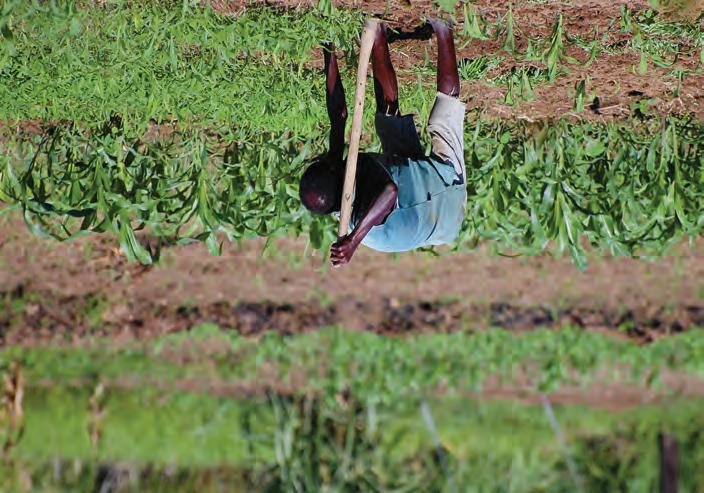
16 minute read
Contents
JUNE
9-11 AVI Africa 2020 GAUTENG www.sapoultry.co.za/home/avi-registration.php
17-19 Agritec Africa NAIROBI www.agritecafrica.com
SEPTEMBER
15-17 HortiFlor 2020 HARARE www.hppexhibitions.com/hfz
18-19 Horti Fair 2020 NAIVASHA www.naivashahortifair.com
OCTOBER
1-3 agrofood & plastprintpack Ethiopia ADDIS ABABA www.agrofood-ethiopia.com
4-7 Iran agrofood TEHRAN www.iran-agrofood.com
14-15 Poultry Africa 2020 NAIROBI www.poultryafrica2020.com
NOVEMBER
8-12 SIMA PARIS www.en.simaonline.com
11-15 EIMA BOLOGNA www.eima.it/en
24-26 agrofood & plastprintpack Kenya NAIROBI www.agrofood-kenya.com
Readers should verify dates and location with sponsoring organisations, as this information is sometimes subject to change. THE NIGERIAN GOVERNMENT has launched the Fertiliser Control Act 2019 to protect the agricultural chain players, manufacturers, producers, blenders, importers, distributors and end-users, thus boosting the economy.
Alhaji Muhammed Sabo Nanono, minister of agriculture and rural development who launched the Act in Abuja, said that it would provide an enabling environment for fertiliser enterprises to grow and safeguard the investment in the agricultural sector and paved the way for return on investment.
The Act provides stiff penalties for offences in the value chain. Nigerian government launches Fertiliser Control Act
Abia seeks AfDB partnership to build agricultural base
NIGERIA’S ABIA STATE governor Okezie Ikpeazu met with African Development Bank (AfDB) president Akinwumi Adesina at the Bank’s headquarters in Abidjan, Cote d’Ivoire to discuss investment for Abia to boost agricultural activities, job creation and enhance livelihoods.
Ikpeazu requested the Bank’s support for the development of major agricultural value chains, including palm oil, rice, cocoa, cassava, maize and cashew, that would also create jobs for women and youth.
“Our vision is to leverage the capacity of our people to become the SME capital of Nigeria. Our people are industrious and innovative. For instance, our people are known as top players in the leather industry. We have a new shoe factory that is producing over 50, 000 shoes. We particularly need the Bank’s help to address the State’s infrastructure deficit,” the governor said.
Abia State is looking to the Bank to help make Enyimba Economic City (EEC), an ambitious economic hub, a reality. Other investment interests include a waste-to-energy project.
The Bank’s support was also sought to facilitate the Abia State Integrated Infrastructural Project which is designed to develop massive infrastructure in the State, especially in the commercial city of Aba and the State capital of Umuahia.
AgriPay brings digital banking to Zambian farmers
ZANACO BANK PARTNERED with the UN Capital Development Fund (UNCDF) and Agrifin Accelerate (AFA)/Mercy Corps to develop and test thE strategy for an account that offers farmers services to transact, save, send and receive money.
To bring the account – called AgriPay – to market, the partners undertook a research conducted by AFA to understand precisely what the farmers needed and what their specific financial challenges were. Once a product was available, strategies were designed to bring the product to the rural market. This strategy involved applying the Booster Team model - a concept adapted from UNCDF’s work in Uganda with a coffee value chain.
The bank piloted the product in six provinces. The Booster Teams, comprising 15 - 20 youth, received adequate training in sales and product knowledge, and approached potential customers with a product they could demonstrate.
Zanaco will add features including agronomic information and financial literacy to help the farmers become more productive,
AgriPay brings digital banking to Zambian farmers- Smallholder farmers are an important segment of the Zambian economy.

to do – increase access and usage of digital financial services by underserved segments. of the population. Image Credit: Adwo/Adobe Stock
Western Cape Department of agriculture appoints new head of agriculture
DR IVAN MEYER, provincial minister of agriculture in the Western Cape, has announced Dr Mogale Sebopetsa as the head of the Western Cape Department of Agriculture (WCDoA).
Dr Sebopetsa currently holds the post of chief director: farmer support and development at the WCDoA. He started working at the Department in 2006 and has been working in the agricultural sector for more than 20 years.
Previously, he worked for the Gauteng Department of Agriculture, Department of Agriculture, Forestry and Fisheries (DAFF) and lectured at the University of Limpopo for some time.
He has played a pivotal role in establishing various policies to the benefit of farmer development - for which he has a great passion - and used this deep interest in improving the lives of farmers as the backbone for his PhD; his research focused on the developing an extension framework for smallholder farming.
Dr Sebopetsa has a clear vision for the Department and has hopes to improve farmer development and food security for the province in his five-year contract period.
“The Western Cape Government has a clear vision when it comes to its citizens, with a focus on bettering lives, this is further emphasised in the five important priority areas as set out by minister Meyer. This can be achievable through the continued goodwill between the Department and the industry. I hope to strengthen and deepen these already existing partnerships and collaborations,” said Dr Sebopetsa.
He hopes to improve farmer development and food security for the province in his five-year contract period.

“I would like to thank the outgoing HoD Joyene Isaacs for her continued guidance and support since 2006. She has done a sterling job in ensuring that the foundations are laid, making it easier for me to expand and build on this legacy,” Dr Sebopetsa noted.
Joyene Isaacs, the outgoing HoD, commented, “Mogale has been a stalwart in the Department and I hand over the reins with confidence knowing he can and will take this Department to new heights.”
Dr Sebopetsa will assume his duties as new HoD for agriculture in the Western Cape from 1 April 2020.
EIB study confirms boost in agricultural productivity
REAL GDP GROWTH in Africa is resilient despite global uncertainty, with small business, manufacturing and agriculture main focus of increased lending, according to the European Investment Bank (EIB). The EIB’s Banking in Africa series: “Financing Transformation amid Uncertainty” has noted that the African banks are optimistic about the future development of local markets.
It is the fifth edition of this economic report that analyses recent developments in the African banking sectors. Based on both macroeconomic and survey data, the report addresses structural issues and
The study expected that economic growth in Africa is projected to accelerate moderately in 2020.


Image Credit: Riccardo Niels Mayer/Adobe Stock)
investment opportunities in Africa and frames policy options for all stakeholders.
“The EIB is committed to investment in Africa in partnership with countries and industry across the continent. The EU Bank has been active in Africa since 1963 and provided a total of US$51.26bn in financing since then,” said Werner Hoyer, president of EIB. “Our new report aims to share understanding and knowledge of African investment trends, and contribute to debate about best practice in investment and financing. Investments are essential for sustainable growth, prosperity, and social progress in Africa. As the European Union’s bank, we will continue to work together with our partners to support sustainable investments, foster inclusive and resilient growth, and reduce poverty,” Hoyer added.
The report has discussed the financing of Africa’s agricultural value chains and their potential to boost agricultural productivity, thereby supporting sustainable economic development.
ALHAJI MUHAMMAD SABO Nanono, minister of agriculture and rural development announced that the mechanised programme will cover cover all stages – from production, industrial processing and marketing – ensuring food security, job creation and economic growth. The agricultural sector contributes 25 per cent of Nigeria’s gross domestic product (GDP), accounting for 48 per cent of the labour force. The growth rate over the last five years averaged four per cent, according to the Nigerian Investment Promotion Commission. However, around 70 per cent of Nigerian farmers are still engaged in subsistence farming, the reason for Nigerian agricultural providing low yields.
The programme will have a nationwide spread with all the 632 local government areas (LGA) covered. “Each LGA will have service centres with a brand-new tractor fully equipped. There will also be stores for seeds, fertiliser and excess produce. With these, we will link farmers up with processing industries especially clusters at the local governments.”
He, however, pointed out that at the initial stage, around 10,000 tractors can be financed and solicited with the help of the private sector to fill in the gap.
The minister added that the mechanisation services would be driven by the people in the LGA’s and encouraged individuals and groups to come up with proposals of managing the service centres, assuring them that the Federal Government will guarantee the facilities. Nigeria to kickstart agricultural mechanisation programme
THE AFRICAN DEVELOPMENT Bank (AfDB), in collaboration with the government of Nigeria, has held a meeting with stakeholders to discuss details around special agro-industrial processing zones in Nigeria.
A workshop was held in Abuja from 17-18 February to address the categorisation and location of the SAPZs, which are meant to kickstart the agriculture sector.
Speaking at the event, Nigeria’s minister for agriculture and rural development, Alhaji Sabo Nanono, lauded the efforts of the African Development Bank and called for all hands to be on deck in the sustainable implementation of the initiative.
The senior special adviser to the president of the AfDB, Oyebanji Oyeyinka-Oyelaran, outlined the strategy for Nigeria, saying it would focus on developing key value chains and select the most promising agricultural clusters.
“The strategy will also promote inclusivity, have a positive multiplier effect in the zones of influence, by increasing yields through the use of modern technologies – improved seed, fertilisers, mechanization, digitization, irrigation and maximise positive engagement of youth and women,” he said.
The forum presented all stakeholders with the opportunity to follow up on outcomes of previous design interventions. The workshop was attended, among others, by Afreximbank, the International Finance Corporation, the Food and Agriculture Organisation, the Development Bank of Nigeria and the Small and Medium Enterprise Development Agency of Nigeria. AfDB and Nigeria to implement special agro-industrial processing zones
FAO’s global action to control fall armyworm outbreaks

Global action is designed to scale up efforts on coordinated mechanism to combat fall armyworm attacks.
FAO HAS ADVANCED global action to control the spread and damage of fall armyworm, a voracious invasive species that is ravaging crops in Africa, Asia and the Near East
“We will need to step up the alliance among major partners from all relevant sectors at the global level,” FAO directorgeneral QU Dongyu said while opening the first meeting of the Steering Committee of the Global action for Fall Armyworm Control.
As much as 18mn tonnes of maize are lost annually in Africa, enough to feed tens of millions of people and representing an economic loss of up to US$4.6bn. Over the past three years, FAO has spearheaded 63 Fall Armyworm-related projects, mostly in Africa, establishing many good practices and accumulating much valuable knowledge along the way.
The global action is designed to support and scale up those efforts through a strong and innovative coordination mechanism. If Fall Armyworm continues to expand, the role of maize in the world's food system could be seriously affected, the director-general said.
Innovation has a big role to play The director-general pointed to an updated smartphone app developed by FAO and known as FAMEWS (Fall Armyworm Monitoring and Early Warning System) as a major tool, available in 29 languages, that channels valuable real-time and field-level information about the pest's location and spread to a global data platform every two hours, while also giving smallholder farmers specific tips on how to cope with and contrast infestations.
The steering committee brought together strategic leaders from governments, multilateral institutions, research institutes, civil society and the private sector, from five continents.
Its members' consultations are expected to help optimize the Global Action Plan ahead of a high-level conference planned to be held at the African Development Bank's headquarters in Abidjan in April.
The global action aims to reduce maize crop losses to three per cent from current levels often 12 times higher.
“It is an ambitious target because it has to be,” said Bukar Tijani, FAO assistant directorgeneral, agriculture and consumer protection department.
AfDB and DAL Group sign deal to transform Sudan’s agribusiness
THE AFRICAN DEVELOPMENT Bank (AfDB) has signed an agreement with Sudan’s DAL Group for the provision of up to US$75mn to improve food security and household incomes in the country
The climate and land of Sudan is suitable for agricultural development and offers potential for growth.
The agreement is the Bank’s first private-sector loan to the East African nation.
DAL Group chairman Osama Daoud Abdellatif said that business in Sudan has suffered for years due to lack of finance for agriculture, noting the agreement marks the first significant financing DAL Group has received.
“At the end of the day, Sudan is an agricultural country, and there is so much we can do. I hope this is the beginning of many projects we can do together,” Abdellatif said.
DAL Group is Sudan’s one of the largest foods and agriculture business company. The Bank loan will contribute to DAL Group’s Investment Programme, part of the company’s strategic growth initiative for Sudan and the East African region. Under this programme, DAL Group aims to reduce the nation’s dependence on imports and increase its capacity to source and produce raw material locally.
The DAL Group employs more than 8,200 people and with the new support from the African Development Bank, the Group will be in a position to create more than 2,000 additional jobs over an eight-year period.
Jennifer Blanke, AfDB’s vice-president for agriculture, human and social development, said, “This is AfDB’s first private-sector loan in Sudan. I am delighted that it is in agriculture and agribusiness, which is so important for Sudan’s development.”
Additionally, the financing will support DAL Group initiatives toward creating a conducive work environment for women and promoting equal opportunities for employment, such as up-skilling and training, creating an adapted industrial working environment that accommodates the cultural needs of women, as well as family-friendly work schedules and social benefits.
The transaction presents an opportunity for the Bank to leverage private sector investments which have considerable development outcomes and additionality, as well as opportunity to support an otherwise underserved Transition State.
Towards Africa’s agricultural transformation The Bank-DAL Group agreement is in line with the priority development objectives of the AfDB Group and consistent with the Bank’s action plan for African agricultural transformation, known as Feed Africa. The Bank’s Feed Africa strategy focuses on transforming African agriculture into a globally competitive, inclusive and business-oriented sector that creates wealth, generates gainful employment and improves quality of life. The Bank is dedicated to assisting African regional member countries in their poverty reduction efforts and agriculture and rural development are primary building blocks.

UNILEVER HAS ACHIEVED 50/50 gender balance in leadership roles across its brands and BASF has committed to increasing the number of women at the top to 30 per cent by 2030 after achieving its 20 per cent by 2020 target a year ahead of schedule.
It comes after a WFA survey laid bare the challenges facing women in the agri-food sector, the differences in opinions between men and women, how women perceive their employers, workplace culture and what they believe are the barriers holding women back. Out of more than 2,500 respondents, 50 per cent of women said they were well represented at the top of food and agricultural businesses.
Results of the survey, commissioned by WFA Summit organiser AgriBriefing, were revealed at last year’s event in Amsterdam.
Delegates said the two-day event, sponsored by Alltech, helped them gain a better understanding of the key challenges facing the sector, while also providing networking opportunities and a chance to develop leadership and management skills through a range of interactive seminars and workshops.
Mary Bowman of Galbraith Group said, “The content and workshops made for a highly motivational experience which made me think forward in my career and gave me a positive boost in confidence regarding the future, both personally and within agriculture in general.”
“Not only was it informative regarding different agricultural practices globally, but it was also hugely inspirational. The plethora of different land-based roles women are undertaking all over the world is extraordinary, giving me some great new ideas about where my career might take me in the future.”
Results of the survey, commissioned by WFA Summit organiser AgriBriefing, were revealed at last year’s event in Amsterdam. Unilever and BASF increasing proportion of women in leadership positions
Germany contributes US$18mn to combat desert locust upsurge in East Africa
FAO DIRECTOR-GENERAL QU Dongyu has welcomed a US$18mn contribution from Germany to provide assistance to those directly affected by the desert locust upsurge in East Africa.
Germany’s Permanent Representative to FAO, Ulrich Seidenberger, made the announcement at FAO headquarters in Rome. The new pledge comes after Germany already contributed US$3.3mn.
Qu said, “We are working to curb the locusts’ spread but we also need to safeguard livelihoods and promote early recovery.”
FAO’s Desert Locust Information Service said it is the worst outbreak to strike Ethiopia and Somalia for 25 years and the worst infestation that Kenya has experienced in 70 years. Djibouti and Eritrea have also been affected, and locusts have been reported in South Sudan, Uganda and the United Republic of Tanzania, although the situation there is less dire.
The director-general stressed the situation was extremely alarming in East Africa, a region where 20mn people are already considered food insecure. There, the swarms have laid eggs and in a few weeks’ time, these will mature, and start to eat crops - right at the start of the region’s main agricultural season.
“Fighting the locusts is half the battle. The other half is helping the people affected,” QU said. “Germany’s support will enable FAO to provide much needed support to the farmers and their families.”
Pasture and croplands have already suffered damage in Djibouti, Eritrea, Ethiopia, Kenya and Somalia, and there are potentially severe consequences for the region where millions rely on agriculture and livestock rearing for their survival.
FAO has appealed for US$138mn in urgent funding to assist the
Locusts are posing significant threat to crop output.

countries that have been impacted. Germany’s announcement raises the amount pledged by donors to US$69mn.
On 10 March, the Government of Japan decided to extend Emergency Grant Aid of US$7.5mn in response to the damage caused by locusts in Kenya, Somalia and Djibouti
locust aid. The grant aims to provide humanitarian assistance in the area of food through the World Food Programme (WFP).
In Kenya, the provision of support is to 80,000 people including children aged at 6-59 months and pregnant women to prevent malnutrition and improve their nutritional condition.
Implementation of resilience-building activities to 87,000 smallscale farmers is also provided for.
THE UK HAS launched the second round of a business innovation challenge fund that will see an additional five promising businesses receive grant funding and technical assistance of up to US$128,309 each.
The call for proposals will seek to support initiatives that are innovative, sustainable and with the potential to stimulate job creation. The funding made available through the Kenya Catalytic Jobs Fund will focus on three thematic areas: agriculture and manufacturing; the informal sector; and people in marginalised groups and areas.
The first call for proposals was launched in April 2019 and saw five successful businesses receive awards, namely: TakaTaka Solutions; Ten Senses Africa; Lynk Jobs Limited; Savanna Circuit Technologies Limited; and BuildHer.
Supported by UKAid, the Kenya Catalytic Jobs Fund is a US$641mn, four-year programme, which tests and support innovaUK to fund five innovative businesses in Kenya
tions with the potential to stimulate large-scale job creation.
Julius Court, the Head of DFID Kenya, said, “The UK is delighted to be part of efforts to tackle such constraints and promote the growth of the private sector in a way that creates opportunities for youth. We are listening when Kenyans tell the world they want mutually beneficial partnerships that move beyond aid and attract quality investment and create millions of jobs.”






